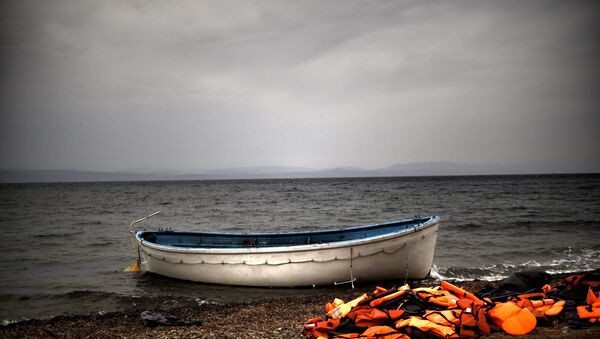According to a report by the Unravelling Mediterranean Migration Crisis project (MEDMIG), the rate of death for migrants trying to reach Europe has increased this year, following efforts to stem the migrant influx.
According to the UN Refugee Agency, 1.015 million refugees and migrants arrived in Europe by sea in 2015. So far this year, following the EU's migrant deal with Turkey and imposition of more border controls, only 334,174 have arrived this way.
However, the lower number of arrivals does not mean a reduction in the number of people attempting the crossing to Europe.
The MEDMIG report found that the total number of people recorded as dead or missing in the Mediterranean in 2016 is higher than the total for 2015.
Since the beginning of 2016, the rates of death have increased from 1 in 54 to 1 in 46 people among those crossing via the Central Mediterranean route, and from 1 death in every 1,063 arrivals to 1 death in every 409 arrivals via the Eastern Mediterranean route.
Professor Heaven Crawley, one of the authors of the report, told Radio Sputnik that so many people are coming to Europe because they have no hope of rebuilding their lives closer to home.
"Those people are being driven from their homes in Syria, Iraq, Libya and elsewhere, and are ending up coming to Europe because they can't rebuild their lives anywhere else on the way."
The report's authors said that while the EU's measures have reduced the number of arrivals, they have also made the migrant journey more dangerous. Of 500 migrants interviewed for the report, every single one said they had used a people smuggler at some point in their journey.
"The reason why the policies have made the situation worse is that there are no safe and legal routes for people who want to access protection under the [1951 Refugee] Convention, for them to do that, and so they have to use people smugglers," Crawley said.
The EU's refugee deal with Turkey has "taken the political heat" from the migrant situation, but it is not a long-term solution to the issue.
"Our research tells us that because the problem hasn't gone away, we can almost guarantee that it will come up again at a later date. Either if the EU-Turkey agreement collapses, which it might well do under the current circumstance, or if we get another set of issues driving people from their homes," she said.
The 1.015 million refugees and migrants who arrived in Europe last year represented a sharp increase from the 280,000 who arrived the previous year. However, the professor says it is relatively small in relation to Europe's population of 500 million.
By comparison, Turkey, with a population of 80 million, has received 3.1 million refugees, 2.7 million of whom are from neighboring Syria. Lebanon, with a population of 6 million, has received 1.14 million refugees from Syria. According to The UN Refugee Agency, there are also 6.5 million people, including 2.8 million children, who remain internally displaced within Syria, which has the biggest internally displaced population in the world.
Crawley said that political factors have prevented the European authorities from finding a comprehensive solution to the migrant influx.
"Because every single movement has this political contention around it, then it becomes a way of states maneuvering in relation to one another. We've seen this in the UK, we've seen the Brexit referendum decision largely framed in terms of migration, even though there's been hardly any impact from the so-called refugee crisis in the UK; the numbers have been very low."
The problem of migration is "probably going to get worse" and requires more leadership nationally, regionally, and globally, Crawley said.
"Migration is a reality in terms of globalization, but it's also a feature of the consequence of some of the conflicts we see, with 65 million people now displaced globally. So, these situations are not going to improve of themselves, they're probably going to get worse with climate change etc., and more competition over resources. So I think it really needs some political leadership nationally, regionally but also at a global level."




